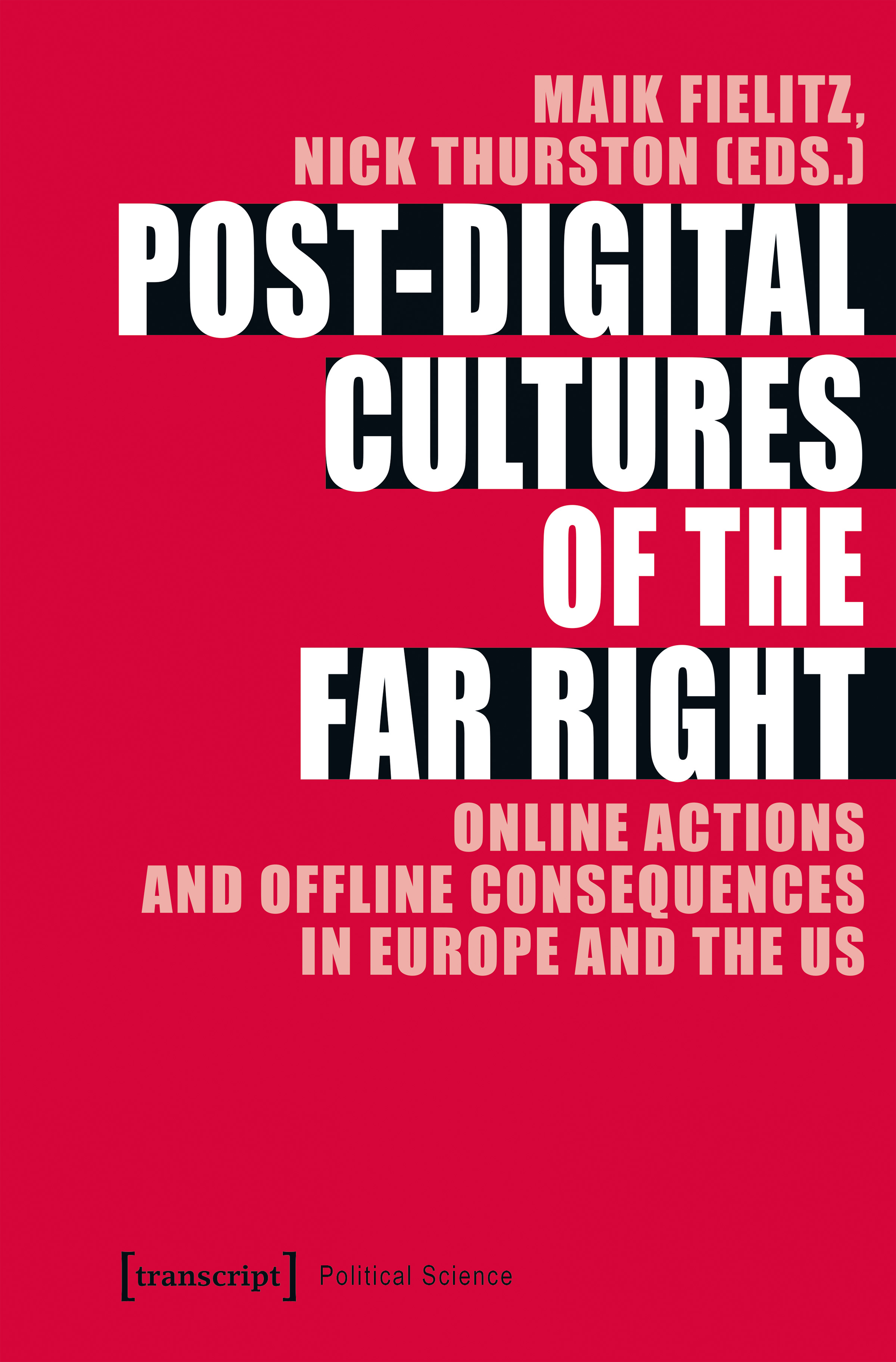Maik Fielitz, Nick Thurston (eds.): Post-Digital Cultures of the Far Right: Online Actions and Offline Consequences in Europe and the US (2018)
Filed under book | Tags: · alt-right, far right, internet, media, memes, political science, politics, postdigital, social media

“How have digital tools and networks transformed the far right’s strategies and transnational prospects? This volume presents a unique critical survey of the online and offline tactics, symbols and platforms that are strategically remixed by contemporary far-right groups in Europe and the US. It features thirteen accessible essays by an international range of expert scholars, policy advisors and activists who offer informed answers to a number of urgent practical and theoretical questions: How and why has the internet emboldened extreme nationalisms? What counter-cultural approaches should civil societies develop in response?”
Publisher transcript, Bielefeld, 2018
Political Science series, 71
Creative Commons BY-NC-ND 4.0 License
ISBN 9783837646702, 383764670X
208 pages
PDF, PDF (updated on 2023-7-31)
Comment (0)Purple Noise: An Exhibition Turned Into an Global Feminist Protest Turned Into a Catalogue (2018)
Filed under artist publishing | Tags: · cyberfeminism, feminism, noise, social media, technology

“In the summer of 2018, a German artist, famous for having a past as cyberfeminist and a present as technofeminist, was invited to Stuttgart in the South of Germany, to create an exhibition dealing with issues of gender and technology as part of a large festival. During her research, she got in touch with numerous fellow artists and activists, and in a process of collective realization, they found that the time has come, not for another exhibition, but for a global technofeminist upheaval.
Learning from the dark forces that understand how to manipulate national referenda and presidential elections, they flooded social media platforms – an area they had previously avoided in order to protest against the centralisation and privatisation of digital communication. Very quickly, however, they have learned how to “motivate” thousands of followers, how to “inspire” them to like and “share” their contents, and even to contribute their own agendas. Within a few weeks, what had started as a small protest, has grown exponentially and conquered not just the Net but also traditional media. They gained enormous power, more than they ever imagined, and now decisions have to be made on how to use this power. Come and help us decide! What would you do if you had power over the Internet – and thus the real world?”
Produced for Monoskop’s Exhibition Library in the 2018 Seoul Mediacity Biennale, 6 September–18 November 2018 at the Seoul Museum of Art.
Self-published in collaboration with Monoskop, Amsterdam, August 2018
[14] pages
PDF (4 MB)
Comment (0)Felix Stalder: The Digital Condition (2016–)
Filed under book | Tags: · algorithm, commons, culture, democracy, digital condition, digital culture, networks, politics, post-democracy, social media, technology, web

“Our daily lives, our culture and our politics are now shaped by the digital condition as large numbers of people involve themselves in contentious negotiations of meaning in ever more dimensions of life, from the trivial to the profound. They are making use of the capacities of complex communication infrastructures, currently dominated by social mass media such as Twitter and Facebook, on which they have come to depend.
Amidst a confusing plurality, Felix Stalder argues that are three key constituents of this condition: the use of existing cultural materials for one’s own production, the way in which new meaning is established as a collective endeavour, and the underlying role of algorithms and automated decision-making processes that reduce and give shape to massive volumes of data. These three characteristics define what Stalder calls ‘the digital condition’. Stalder also examines the profound political implications of this new culture. We stand at a crossroads between post-democracy and the commons, a concentration of power among the few or a genuine widening of participation, with the digital condition offering the potential for starkly different outcomes.
This ambitious and wide-ranging theory of our contemporary digital condition will be of great interest to students and scholars in media and communications, cultural studies, and social, political and cultural theory, as well as to a wider readership interested in the ways in which culture and politics are changing today.”
First published in German as Kultur der Digitalität, Suhrkamp Verlag, Berlin, 2016.
Translated by Valentine Pakis
Publisher Polity Press, Cambridge, UK, 2018
ISBN 9781509519590, 1509519599
xi+204 pages
Reviews (in German)
Comment (0)
